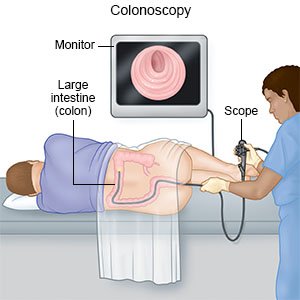Colonoscopy
Medically reviewed by Drugs.com. Last updated on Aug 4, 2025.
What do I need to know about a colonoscopy?
A colonoscopy is a procedure to examine the inside of your colon (intestine) with a scope. A scope is a flexible tube with a small light and camera on the end.
How do I prepare for my colonoscopy?
Give your healthcare provider a list of all the medicines, supplements, and herbs you take. Your provider will tell you if you need to stop any medicine for the colonoscopy, and when to stop. Your provider will tell you which medicines to take or not take on the day of your colonoscopy. Arrange for someone to drive you home after your procedure.
How is bowel prep done?
Your healthcare provider will have you prepare your bowels before your procedure. It is important for your bowels to be empty before your procedure to allow your provider to see your colon clearly. You will need to do the following:
- Have only clear liquids for the entire day before your colonoscopy. Clear liquids include plain gelatin, unsweetened fruit juices, clear soup, and broth. Do not drink any liquid that is blue, red, or purple.
- Follow your bowel prep as directed. Many different preparations can be given before a colonoscopy. With any bowel prep, stay close to the bathroom. This prep will cause your bowels to move often.
- Use an enema if directed. Your provider may tell you to use an enema to help clean out your bowels.
Related medications
What will happen during my colonoscopy?
- You will be given medicine to help you relax. You will lie on your left side and raise one or both knees toward your chest. Your healthcare provider will examine your anus and use a gloved finger to check your rectum. You may need another enema if your bowel is not empty. The scope will be lubricated and gently placed into your anus. It will then be passed through your rectum and into your colon. Water or air will be put into your colon to help clean or expand it. This is done so your healthcare provider can see your colon clearly.
- Tissue samples may be taken from the walls of your bowel. If you have a polyp, your healthcare provider will remove it. Tissue samples and polyps are sent to a lab for tests.
 |
What will happen after my colonoscopy?
You may feel bloated or have some gas and abdominal discomfort. You may be asked to pass gas before you go home. You may need to lie on your left side with a heating pad on your abdomen. Eat small meals until your bloating has improved.
What are the risks of a colonoscopy?
You may have pain or bleeding. You may also have a slow heartbeat, decreased blood pressure, or increased sweating. Rarely, your colon may tear due to the increased pressure from the scope and other instruments. This may cause bowel contents to leak out of your colon and into your abdomen. If this happens, you may need to stay in the hospital and have surgery on your colon.
Care Agreement
You have the right to help plan your care. Learn about your health condition and how it may be treated. Discuss treatment options with your healthcare providers to decide what care you want to receive. You always have the right to refuse treatment. The above information is an educational aid only. It is not intended as medical advice for individual conditions or treatments. Talk to your doctor, nurse or pharmacist before following any medical regimen to see if it is safe and effective for you.© Copyright Merative 2025 Information is for End User's use only and may not be sold, redistributed or otherwise used for commercial purposes.
Learn more about Colonoscopy
Treatment options
Symptoms and treatments
Further information
Always consult your healthcare provider to ensure the information displayed on this page applies to your personal circumstances.
